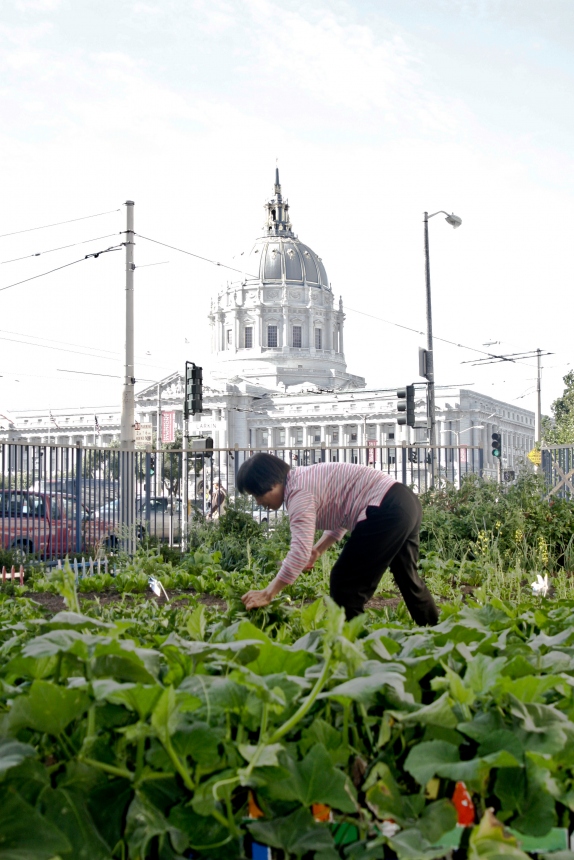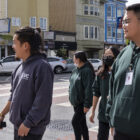San Francisco could have required Twitter to pay at least $3.5 million to pay for a long list of neighborhood social services, business development and streetscape improvements when it passed a tax break in April aimed at keeping the social media giant from leaving the city.
But as the Board of Supervisors proceeded swiftly to seal the deal on a special tax zone, which would exempt Twitter from about $70 million in payroll and stock option taxes over six years, community groups, city representatives and the company could not come to consensus fast enough to settle on
a draft of a community benefits agreement that some politicians had promised would come first.
As a result, the draft community agreement is back on the drawing board, and when it re-emerges months from now could be scaled back or replaced entirely. On Tuesday, the Board of Supervisors will vote on creating an advisory committee to handle new agreements with any business taking advantage of the tax zone.
City leaders had trumpeted the Twitter deal, including a six-year payroll tax exemption, as a way to bring needed business to an underdeveloped stretch of central Market Street. Jane Kim, supervisor for District 6, which includes the redevelopment zone, repeatedly said before the tax exemption vote that the community benefits agreement would bring immediate neighborhood improvements.
The March 23 draft agreement, obtained by the Public Press, included $3.5 million in benefits over six years, plus a donation worth 1 percent of pre-tax income and numerous requirements of the company with no specific dollar value. Those benefits would have started when Twitter moved into the old SF Mart furniture showroom building at 10th and Market streets in 2015. They included:
- $500,000 a year for six years, split between “stabilization funds” for SoMa and the Tenderloin. The money would have supported small businesses, the arts and “community cohesion” projects, including the establishment of a neighborhood grocery store.
- $500,000 total to upgrade neighborhood amenities such as the Tenderloin People’s Garden, United Nations Plaza and Boeddekker Park.
- Providing free Wi-Fi to residents near Twitter’s new headquarters at 1355 Market St.
- Promising that at least 40 percent of new employees be San Francisco residents.
- Coordinating internships, and volunteer workshops for neighborhood youth to teach social media skills and prevention of Internet bullying.
- Donating all used electronics to community organizations.
- Hiring a community liaison and building a neighborhood Internet presence.
- Allowing community organizations to install quarterly art exhibits in the storefronts of Twitter’s new block-long art deco facade.
At the March 23 meeting of the Board of Supervisors budget and finance committee, Kim promised that the supervisors would postpone the vote on the tax exclusion if the community benefits agreement were not approved.
But during behind-closed-door negotiations that included representatives of Twitter and the Mayor’s Office of Economic and Workforce Development before the April 5 vote, the original community benefits agreement was dropped from consideration by the board.
NEIGHBORHOOD DISAPPOINTMENT
Some activists and neighborhood residents said the proposal to create a committee to draft future community benefits agreements was too little too late.
“Maybe the city didn’t negotiate as it should have,” said Don Falk, executive director of the Tenderloin Neighborhood Development Corporation, which builds and manages low-income housing.
Falk said the deal should be understood as a business negotiation with Twitter. He argued that the city lost its bargaining power when Twitter secured its tax exemption, wasting a rare chance to bring money and opportunity to low-income residents nearby.
“We were asking for a community benefits agreement to be locked in before it was approved,” Falk said. “The argument against that is that they would have walked. No one can say whether they would have or not.”
Still, others in the neighborhood said the formation of a new committee was an important step that would give the community a chance to weigh in on agreements.
“I think Twitter feels that that was the end of the conversation,” said Dina Hilliard, interim director of the Tenderloin North of Market Community Benefit District. “This trailing legislation will make them think again about that.”
If the legislation is adopted Tuesday, an 11-member committee would meet four times a year to plan and approve all benefits agreements under the Central Market/Tenderloin Payroll Tax Exclusion, which covers a roughly 30-block area including parts of the Tenderloin and SoMa that straddle Market Street. Under the program, any business with an annual payroll of more than $1 million moving into the zone must enter into a community benefits agreement.
PLAYING CATCH-UP
During the April 5 supervisors’ meeting, just before the exemption passed, Supervisor Ross Mirkarimi asked his colleagues to postpone the vote to allow for a public hearing on the benefits agreement. He said that a consensus on neighborhood benefits was the only way to rationalize passing a business tax break.
“The fact that a community benefits agreement is being promised after the fact only proves the point that we said several weeks ago — that a CBA has no binding authority, and there is no statutory authority for Twitter to be able to deliver the goods,” Mirkarimi said.
Falk said that the community still has leverage over Twitter. The final language of the tax exemption zone does not give Twitter any specific advantages. To be approved, the company would still have to accede to the final language of the proposed community benefits agreement.
Falk said that was cold comfort. “I’m afraid the pressure will be too great to approve it virtually regardless of what’s in the CBA,” he said.
Amy Brown, San Francisco’s city administrator, said no one from her office promised that the Twitter community benefits agreement would come first. She acknowledged that Twitter had already been in negotiations prior to the April 5 vote, but emphasized that the agreement was not required until Twitter applied for the exemption.
Brown said the advisory committee “will represent the community, and we think they will be in the best position to give advice when these benefits are applied for.”
Angelica Cabande, director of the South of Market Community Action Network, said the original community benefits agreement “was very watered down.”
“We don’t see the Office of Economic and Workforce Development as the entity that should be negotiating for us,” Cabande said. “We feel the community should be involved.”
And that’s why, she said, it was unfortunate that the tax deal was approved without even the committee in place.
“We’re working on the campaign to address displacement and accountability for all businesses that are applying” for the tax exemption, she said. Cabande argued that the agreement should have included more conditions to prevent indirect displacement of neighbors once Twitter moves in.
A SUPERVISOR’S INFLUENCE
In an email, Kim said the creation of the Citizen’s Advisory Committee would ensure that the community had a voice.
“This legislation states that before any company avails itself of the mid-Market tax incentive, it must first participate in a community-led process and enter into a binding agreement to help our neighborhood,” Kim said.
If approved, the committee would consist of four neighborhood residents, including one senior or disabled member, one representing low-income housing, and one member of a community organization. Experts in real estate, small business, job creation, affordable housing and homelessness would also be included.
The advisory committee would hold a public hearing within one month of reaching an agreement on a community benefits agreement with a company.
Mathias Mormino, a legislative aide for Kim, said the committee would fashion an agreement that reflects the community’s needs — “and not the supervisors’.”
“It’s appropriate for the community to have that conversation with the company,” he added.
Hilliard, of the neighborhood Community Benefit District, echoed Mormino’s concerns about participation.
“With the original CBA, I’m not sure how much of a say the community had,” she said. “It is a difficult conversation to have but it’s a necessary conversation and it should be done at a public realm.”
DOUBTING THE REAL BENEFITS
Kay Griffin, a 44-year San Francisco resident, said she is not convinced that the money earmarked for a stabilization fund in the original agreement would have benefit the residents themselves. She noted that the Twitter windfall comes at a time when the city is proposing to slash senior and disabled services in its 2011-2012 budget.
“I’m not seeing anything coming out of the SoMa stabilization funds,” said Griffin, who lives one block from the building where Twitter is to be located. “It’s not going to trickle down to me. I know it isn’t.”
“I would like to see them quit defunding everything,” she said. During negotiations, Twitter had asked the city for a direct bus from the downtown Caltrain depot. “Well I want my own bus too,” Griffin said.
In addition to Twitter moving to mid-Market, a police substation is coming to Sixth Street in early 2012. Burning Man and Zendesk will move their headquarters to mid-Market, and a Pearl’s Deluxe Burgers is scheduled to open at the corner of Sixth and Market this August. Developers are also considering offers from retailers, including a health club, that want to move into Twitter’s new building.










